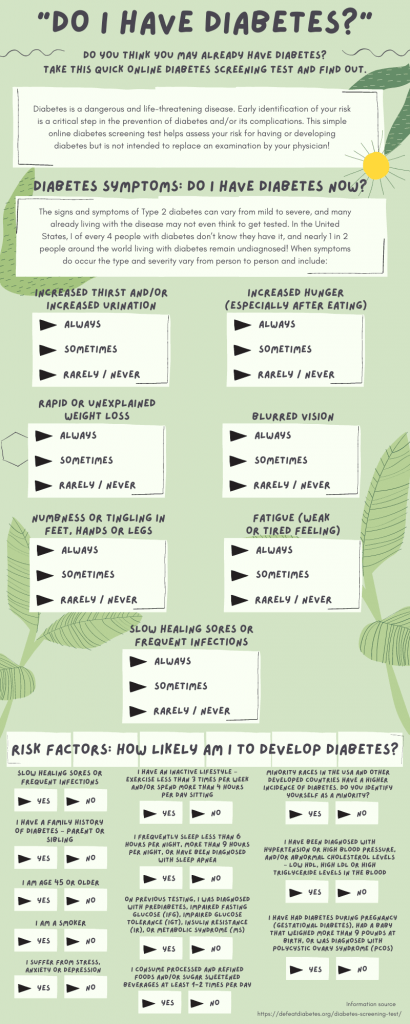Uncategorized

Diabetes and Sleep
Diabetes and sleep
Many benefits may be gained from a sufficient amount of sleep. Many complications may arise from having diabetes. Discover the role sleep plays in the control of your diabetes.
The ability to get a decent night’s sleep is a privilege. It’s common for people to go to bed later than they’d like because they’re trying to juggle too many things at once, such as school, job, exercise, and family. One-third of individuals in the United States are chronically sleep-deprived, which has been linked to an increase in the likelihood of developing type 2 diabetes, cardiovascular disease, obesity, and depression.
Not getting enough sleep has detrimental effects on all aspects of diabetes treatment, including food intake: insulin sensitivity, state of mind, and the foods you choose to consume.
A well-maintained home may do wonders for your attitude and energy levels in addition to helping you better control your diabetes.
Just how much sleep do you require?
In order to maintain excellent health, getting enough sleep is crucial at any age. The optimal amount of sleep you need shifts as you become older. It has been suggested that individuals need at least 7 hours of sleep every night by the American Academy of Sleep Medicine and the Sleep Research Society. Youths and younger children need more.
Neglecting Your Sleep May Have Consequences
Your diabetes will be more difficult to control if you consistently obtain fewer than 7 hours of sleep every night.
Lack of sleep may:
- Decrease insulin resistance.
- Cause you feel less full after eating and hungry the next day.
- Cause you to want unhealthy, high-carb, high-sugar meals.
- Increase the difficulty of losing weight
- Cause a spike in blood pressure and a significant increase in the probability of cardiac arrest.
- Decrease your body’s resistance to illness.
- Raise the odds of experiencing emotional distress.
The Best Ways to Sleep More
Sleep Well.
You should focus less on the quantity and more on the quality of your sleep. Some indicators of poor sleep quality include:
- After getting enough shut-eye, you still don’t feel refreshed.
- Maintaining a pattern of waking up many times over the night.
- Experiencing sleep disorder symptoms (such as snoring or gasping for air).
Night owls are typical, as are those who rise early throughout the week but sleep in on the weekends.
Although it would be nice to make up for lost time, your brain cannot benefit from the additional sleep.
Making sure you receive adequate quality sleep on a constant basis requires maintaining a regular sleep schedule (waking up and going to bed at around the same time each day, including on weekends).
You may benefit from the following suggestions:
- Maintain a calm and restful atmosphere in your bedroom by keeping the lights off and the temperature down. The optimal temperature for sleeping, according to experts, is 65 degrees.
- Get the TV, computer, and phone out of bed.
- Try to get some exercise into your day.
- Before turning in for the night, let your mind decompress.
- Set a regimen that helps you wind down before night, such as a pre-shower shower, light reading, or journaling.
- Just go to sleep when you feel like it.
Furthermore, here are some things to keep in mind to avoid:
- Caffeine in the late afternoon and evening. The effects might last for as long as 8 hours.
- When consumed in the evening, alcohol might disrupt sleep breathing. It may also disrupt your sleep and make it less restful.
- Dinners that go till the wee hours of the morning. In addition to raising overnight blood sugar and bloating, eating late at night is also associated with gastrointestinal distress.
- It’s OK to nap after 2 o’clock. Because of this, you may feel less exhausted when it’s time for bed.
- Nicotine has similar effects as caffeine.
Get in touch with your doctor if you’re still having trouble sleeping.
FAQ
- Does diabetes impact your ability to get to sleep?
To compensate for elevated blood sugar, the kidneys increase the frequency of urination. In the middle of the night, you get up to go to the toilet, which disrupts your sleep. Sleep problems are yet another side effect of high blood sugar, headaches, thirst, and fatigue.
- Why do diabetics wake up in the middle of the night?
Nocturnal hypoglycemia occurs when a person’s blood glucose level drops below 70 mg/dl while they sleep. According to studies, almost half of all bouts of low blood glucose, including more than half of all severe episodes, are thought to occur at night when people are sleeping.
- What happens if a diabetic sleeps too much?
Besides hemoglobin A1c, sleep duration was shown to be associated with additional diabetes risk variables. For instance, those who slept for more than 8 hours each night tended to have higher fasting blood sugar levels.
- What can diabetics take to help them sleep?
According to anecdotal information gathered from several diabetic message boards, melatonin and antihistamines are the most often used treatments for sleeplessness. You won’t be so knocked out by these drugs that you won’t wake up in an emergency or from low blood sugar if you take them as directed.
- Why do diabetics wake up at 3 am?
A person with diabetes won’t see an increase in insulin production to counteract the spike in blood sugar levels that occurs first thing in the morning. The name “dawn phenomena” comes from the fact that it often occurs between 3 and 8 in the morning. Almost all diabetics experience the dawn effect at some point.
- Is napping healthy for people with diabetes?
The chance of getting type 2 diabetes is increased by taking naps throughout the day. Also, research seems to show that the capacity of people with type 2 diabetes to regulate their blood sugar is influenced by short and lengthy sleep duration and midday naps.
- Does sleep affect your A1C?
People who reported sleeping less than 5 hours per night or more than 8 hours per night had significantly higher levels of hemoglobin ATC in their blood, indicative of poor blood sugar control over the previous 2–3 months, compared to those who reported sleeping the recommended 7–8 hours per night on the questionnaires.
- Why do diabetics wake up tired?
Both high and low blood sugar levels are major causes of fatigue. Fatigue may occur from either an inadequate quantity of circulating insulin or an excessive amount of blood glucose.
- Why does a diabetic get sleepy after eating?
Feeling sleepy after eating may be a sign of hypoglycemia in people with prediabetes, Type 1, or Type 2 diabetes. Consuming an excessive amount of sugar might lead to hyperglycemia.
- Can high blood sugar levels be caused by not getting enough sleep?
Repeated nighttime awakenings, inadequate sleep, excessive sleep, and irregular sleep schedules have all been linked to an increased risk of developing glucose intolerance in a variety of studies. If a person has prediabetes or diabetes, they will have a more challenging time getting a good night’s rest.
- Do people with diabetes tire easily?
Research shows that persons with type 2 diabetes often struggle with acute weariness, making daily tasks difficult. It has such a profound effect that medical professionals often talk about “diabetes weariness.”
- How can one get over the exhaustion brought on by diabetes?
A few pointers are as follows:
- You should get between 7 and 9 hours of sleep nightly.
- Consistent physical activity is highly recommended.
- Cut off all the sugary and processed meals.
- If you’re an alcoholic, cut back.
- Caffeine is OK, but only in moderation.
- Instead of stressing out, try yoga or meditation.
- Why does my blood sugar go so high when I sleep?
Too little insulin with supper or a substantial meal or snack before bed may lead to overnight highs in blood sugar. Changing your diet or the timing of your medications would be beneficial. If your numbers seem OK before night, then you’re taking too little medicine.
- What is the recommended amount of sleep time for someone with high blood sugar or diabetes?
Your blood sugar will be more difficult to control if you consistently obtain fewer than 7 hours of sleep every night.
Reversing Diabetic Neuropathy
Picture living with the lingering reality that one day you’ll wake up not feeling your feet, and this lost sensation could result in infection, ulceration, or even your limbs being amputated. This dingy and yet actual condition is referred to as diabetic peripheral neuropathy (DPN).
Around 60% to 70% of patients living with diabetes suffer nerve damage at some point, according to research carried out by the National Institute of Diabetes, Kidney, and Digestive Disease.
Can diabetes be controlled using medication?
Well, no. diabetes cannot be treated using medication alone. Our culture has brought in some fantasy that you can consume anything, not exercise, and that some injections or a few pills will fix any disease. However, this is all a fallacy.
Diabetes appears treatable with pharmaceuticals only on the surface. Hemoglobin A1C and fasting blood sugar levels all seem to improve with time. Looking at these key indicators, you can conclude that a patient is doing pretty well, but these can be quite misleading if not combined with a closer look at the patient’s lifestyle and dietary habits.
Fasting blood sugar tests are typically carried out within eight hours of fasting and are a clear indication of your sugar levels currently under controlled conditions. They are not an accurate reflection of possible blood sugar levels over time. Hemoglobin A1C tests measure your glycated hemoglobin levels in three months, usually the lifespan of red blood cells. This provides a more realistic reflection of your blood sugar levels.
If you’ve got a diabetes peripheral neuropathy condition, it’s essential to keep a diet journal if you want to regulate your sugar levels and keep your diet in check. Most diets are sorely redefined carbohydrates. These glycemic-filled and processed foods are the primary cause of diabetes.
Instead of eradicating these illness-causing foods from the diet, most people depend on prescribed medication. This brings in some sense of false security. Yes, take the drug, but better still, combine these with exercises and proper dieting.
Every time you consume carbohydrates, your sugar levels go above average. If this happens, then you are at risk of suffering from glycation. Glycation refers to the damage of the microscopic blood vessels in the body, usually caused by excess blood sugar. This then results in nerve degeneration, causing neuropathy.
So, what can be done to reverse neuropathy?
First, be your health advocate. Learn all you can about eating healthy and practice it while still taking your medication as prescribed. This is the essential step that you must stake if you’re on the verge of reversing or preventing diabetic peripheral neuropathy and all the negative implications that it tags along.
If you’ve got diabetes, changing your diet is a must. So, what should you be eating?
Protein. Ensure your diet is 40% pure, healthy lean protein. Always include grass-fed chicken, pork, lamb, beef, or fish in your diet. Be sure to include vegetarian protein sources such as tempeh and traditionally prepared soya too.
Organic. Consuming organic dishes reduces your body’s toxic load, making it less harmful to your immune system.
Fat. Include 30% fat in your diet. Use healthy fats while cooking. Healthy fats include olive oil, sunflower oil, sesame oil, and grapeseed oil. Also, add seeds and nuts as primary snacks in your diet and negligible amounts of dairy.
Carbs. Carbohydrates should take up less than 30% of your diet. You should focus majorly on vegetables, fruits, sprouted grains, and whole grains as well. Avoid excessive consumption of processed starchy vegetables, sweetened beverages, baked goods, alcohol, and fruit juices.
Careful assessment of your dietary portions and eating a balanced diet will reduce medication uptake and, in most cases, eliminate their use. Preventing sugar peaks and eating healthy reduces glycation damage and speeds up the healing process of the damage already caused. Be sure to exercise regularly and take enough water too.
It’s evident that the ideal way to treat neuropathy is prevention. Nonetheless, if DPN manifests, you can always reverse it only if you become more proactive and educate yourself more. Remember, eat healthily, exercise more, and you may never need those pills anymore!
Reversing Diabetic Neuropathy

Alcohol and its Effect on Diabetes
Blood Sugar Support. Alcohol is a depressant. It depresses the central nervous system and affects every organ of  the body because it is absorbed rapidly by the stomach and intestine and enters the bloodstream. Effects of alcohol on the body depends on how much it is consumed. Small amount of alcohol acts as stimulant and make people feel happy and talk a lot while too much alcohol can impair the body. Alcoholic drinks are full of empty calories, have no nutritional value and also has full of sugar. it can negatively alter the blood sugar levels and puts drinkers at a high risk of developing alcohol-related diabetes.
the body because it is absorbed rapidly by the stomach and intestine and enters the bloodstream. Effects of alcohol on the body depends on how much it is consumed. Small amount of alcohol acts as stimulant and make people feel happy and talk a lot while too much alcohol can impair the body. Alcoholic drinks are full of empty calories, have no nutritional value and also has full of sugar. it can negatively alter the blood sugar levels and puts drinkers at a high risk of developing alcohol-related diabetes.
Drinking alcohol not only affects the blood sugar, it also increases the insulin secretion and leads to low sugar in the blood. Too much alcohol interrupts normal production of glucose and the hormones regulating it and leads to high blood sugar levels.
Effects of Alcohol
- Alcohol increases the blood sugar levels because it stimulates appetite which results to overeating. It can affect the will power by increasing bad dietary choices. Some medications should not be taken with alcohol. It can increase blood pressure.
- Too much alcohol can lead to symptoms similar to that of low blood sugar. This includes confusion, sleepiness, blurry vision, headaches, lightheadedness or dizziness, lack of coordination and unconsciousness.
 People with diabetes should avoid mixing drinks and cocktails to prevent increase in blood sugar levels. Women with diabetes should not have more than one drink of alcohol per day and men should limit their drinks to only two per day. Sip drinks slowly and alternate your alcoholic drink with water so you can be clear-headed and to help you hydrated. Food helps slow down alcohol absorption and does not affect production of glucose, so don’t drink on an empty stomach or when your blood sugar is low. If you have to drink, choose the light beers or calorie-free drink mixes to help you keep your sugar in check.
People with diabetes should avoid mixing drinks and cocktails to prevent increase in blood sugar levels. Women with diabetes should not have more than one drink of alcohol per day and men should limit their drinks to only two per day. Sip drinks slowly and alternate your alcoholic drink with water so you can be clear-headed and to help you hydrated. Food helps slow down alcohol absorption and does not affect production of glucose, so don’t drink on an empty stomach or when your blood sugar is low. If you have to drink, choose the light beers or calorie-free drink mixes to help you keep your sugar in check.
Diabetic people should be wary of drinking alcoholic drinks. Stay on the recommended dosage to prevent reduction of the effectiveness of insulin and wipe out their energy storage. Check your blood sugar levels before and up to 24 hours after drinking and before going to bed.
Consumption of carbohydrates before drinking is advised to help keep steady blood sugar level. It has been found that moderate drinking of alcohol and taking in Blood Sugar Support supplements can lower the risk of developing type 2 diabetes than those who do not. However, it is best to stay on the recommended consumption.![]()
![]()
![]()
![]()
![]()
![]()
Tom Hanks Has High Blood Sugar
Tom Hanks, in an interview on The Late Show With David Letterman disclosed that he has been diagnosed with Type 2 diabetes.
He has been struggling with high blood sugar since he was 36 years old. Mr Hanks said about his condition “It’s controllable”.
David Letterman also mentioned that he had to go on a special diet due to his high blood sugar.
Both should try natural methods for lowering their blood sugar.
Tom Hanks Has High Blood Sugar
Find Out How Does Exercise Affect Diabetes
Although diabetes is a difficult medical condition for anyone to handle it can be controlled. One of the ways how it can be handled comes from a good exercise plan. When asking how does exercise affect diabetes it helps to keep these factors in mind.
High blood glucose levels caused by diabetes can cause damages to organs. With exercise the body’s muscles can take in much of the body’s glucose. As a result of this the organs will not be pressured by too much. This can easily reduce the impact of diabetes on the body.
One of the most common ailments diabetics can have is heart disease. This is primarily due to the dependence the body has on insulin. When exercise is used weight can be lost so that blood pressure levels can be cut. After this occurs the risk that one has for heart disease will be reduced.
People with diabetes can end up having less energy than other people can. With this in mind the body will not be able to properly get its nutritional needs. Important nutrients for the body can be lost. With exercise endurance levels in the body can increase thus helping to get more energy created. As a result the nutritional needs that one has will be more likely to be met.
Exercise can be used to affect diabetes in many positive ways. Exercise can get one’s blood glucose to be properly managed. With greater weight control blood pressure and the need for insulin injections can be reduced.![]()
![]()
![]()
![]()
![]()
![]()






